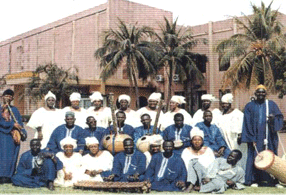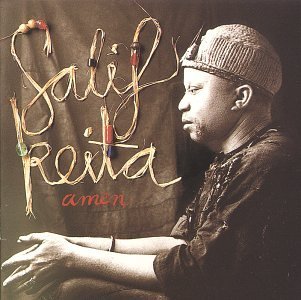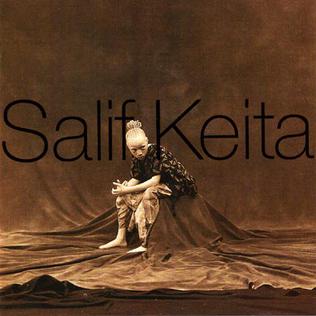
The music of Mali is, like that of most African nations, ethnically diverse, but one influence predominates: that of the ancient Mali Empire of the Mandinka. Mande people make up around 50% of Mali's population; other ethnic groups include the Fula (17%), Gur-speakers 12%, Songhai people (6%), Tuareg and Moors (10%).

Salif Keïta is a Malian singer-songwriter, referred to as the "Golden Voice of Africa". He is a member of the Keita royal family of Mali.
The Rail Band is a Malian band formed in 1970; it was later known as Super Rail Band, Bamako Rail Band or, most comprehensively and formally, Super Rail Band of the Buffet Hotel de la Gare, Bamako.
African popular music, like African traditional music, is vast and varied. Most contemporary genres of African popular music build on cross-pollination with western popular music. Many genres of popular music like blues, jazz, afrobeats, salsa, zouk, and rumba derive to varying degrees on musical traditions from Africa, taken to the Americas by enslaved Africans. These rhythms and sounds have subsequently been adapted by newer genres like rock, and rhythm and blues. Likewise, African popular music has adopted elements, particularly the musical instruments and recording studio techniques of western music. The term does not refer to a specific style or sound but is used as a general term for African popular music.
Africando is a musical project formed in 1992 to unite New York-based salsa musicians with Senegalese vocalists. Musicians from other African countries were later included under the name Africando All Stars.

"Two Hearts Beat as One" is a song by Irish rock band U2. It is the seventh track on their 1983 album, War, and was released as its second single in the United States, United Kingdom, and Australia on 21 March 1983.

Amen is the third studio album by Malian artist Salif Keita, released in 1991 by Mango Records. The album reached No. 1 on the Billboard World Albums chart.

Folon is an album by the Malian artist Salif Keita. It was released in 1995 by Mango Records.

Waliou Jacques Daniel Isheola "Wally" Badarou is a French musician. Born in France with ancestry from Benin, West Africa, Badarou is known for his close association with the English group Level 42, and for his prolific work as a session musician with a wide variety of performers from around the world.

Dial 'M' for Motherfucker is an album by the New York City garage punk band Pussy Galore, released in April 1989 by Caroline Records. The song Kicked Out is played in an Episode of House, "Games", when Gregory House plays it to annoy Wilson and later to induce a seizure in a patient.

Abdoulaye Diabaté is a singer and guitarist who was born to a griot family in Kela, Mali in 1956. He has at least twenty years of experience in contemporary and popular music.

Seckou Keita is a kora player and drummer from Senegal. He is one of the few champions of the lesser-known kora repertoire from Casamance in southern Senegal.
Manthia Diawara is a Malian writer, filmmaker, cultural theorist, scholar, and art historian. He holds the title of University Professor at New York University (NYU), where he is Director of the Institute of Afro-American Affairs.
Mamadou Sidiki Diabaté is a prominent Mandé kora player and jeli from Bamako, Mali. He is the 71st generation of kora players in his family and a son to Sidiki Diabaté.
SMOD is a Malian musical band established in 2000 made up originally of Sam, Mouzy, Ousco and Donsky. The name of the band is an acronym of their first names. Mouzy eventually left the band to pursue a solo career in France. Their music is a mix of rap, hip hop, folk and traditional music. Smod is also a common pet name given to a loved one
Kélétigui Diabaté was a Malian musician, described as an "undisputed master" of the balafon, and as "one of the greatest figures in Malian contemporary music".
Monique Séka is a singer from Ivory Coast. With the musical fusion that she generates, Monique Seka's Afro-zouk music is popular across Ivory Coast, Africa, the Caribbean and the Indian Ocean.

New Ancient Strings is a studio album by the Malian musicians Toumani Diabaté and Ballaké Sissoko, released on 22 June 1999 by the British label Hannibal Records. The album comprises eight instrumental duets composed by Diabaté for kora, a stringed instrument of West African music. Diabaté and Sissoko are esteemed as the best and the second-best kora players of their generation, respectively. Their duets were recorded in a single live take within a marble hallway of Bamako's conference centre on the night of 22 September 1997, coinciding with Mali's Independence Day.
Kassé Mady Diabaté was a Malian singer, musician and griot. His soft and particular voice with deep undertones – an atypical characteristic for a griot – earned him the nickname "The golden voice of Mali". He is considered, together with Salif Keita, as one of the greatest Mandinka artists of his generation.
Papa is an album by the Malian musician Salif Keita, released in 1999. It is a tribute to Keita's father, who died in 1995.










